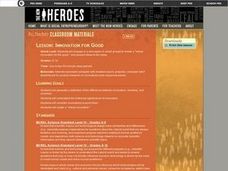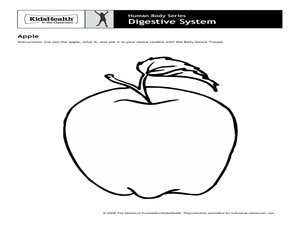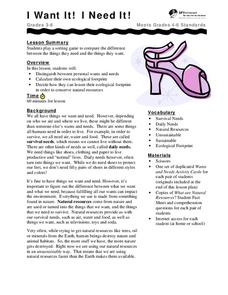Curated OER
Dig In
Students identify where vegetables originate from. In this agriculture instructional activity, students use a search engine to find out where certain vegetables originate from. Students plot the information onto a world map.
Curated OER
Nine Planets
What are characteristics of a planet? With this plan, learners investigate the characteristics of the planets in our solar system. They gather research of the nine planets by using the Internet and other research tools. Then they create...
Curated OER
Innovation for Good
Many historical innovations were created for the common good. Get your students ready for life as a critical thinker with this lesson which defines the differences between innovation and invention. They will conduct Internet research,...
Catholic Charities
Telephone Skills
The challenge in telephone conversations is that speakers and listeners cannot rely on body language to communicate. This 31-page packet includes a curriculum guide, lesson plans, assessments, and resource lists designed to help language...
Social Media Toolbox
Social Media Usage
Is there a difference in the way organizations present news via social media and in print? The third in a series of 16 lessons from The Social Media Toolbox explores news outlets and their delivery methods. Groups follow a story for a...
Curated OER
You and the Military
Do military recruiters plan to visit your campus? If so, the visit presents an opportunity for class members to engage in a series of action projects. Class members interview recruiters, propose a PTA meeting to discuss the pros and cons...
PBS
What Are the Primaries and Caucuses?
What are the essential differences between primaries and caucuses? As part of a study of the process by which Americans select their candidates for US president, class members examine the nominating process, the changes that have...
Curated OER
Valentine's Day: Love Letters
Oh the joys of love! As a special Valentine's Day assignment, budding authors research the life of one of the most romantic poets, Keats. They read the letter, "To Fanny Brawne, 13 October 1819," then compose a love letter of their own....
Discovery Education
Sonar & Echolocation
A well-designed, comprehensive, and attractive slide show supports direct instruction on how sonar and echolocation work. Contained within the slides are links to interactive websites and instructions for using apps on a mobile device to...
NASA
Hurricanes and Hot Towers with TRMM
Take cover because a wild presentation on hurricanes is about to make landfall in your classroom! An outstanding PowerPoint presentation is the centerpiece of this lesson. Not only does it provide information and photographs, but several...
Curated OER
Human Body Series - Digestive System
With articles entitled, "What's Puke?" and "What is a Fart?" this digestive system lesson is sure to be a gas! Elementary anatomists do a belly dance to illustrate how food moves through the digestive system and then design a board game...
The New York Times
Crossing the Line Online: Sexual Harassment and Violence in the Age of Social Media - NYTimes.com
Sexual harassment and sexual violence are by no means new issues. What has changed is the role of social media in these issues. This powerful and troubling lesson uses a specific rape case to launch research into a discussion of the...
Council for Economic Education
Satisfaction Please! (Part 3)
Understanding the US government's role proves very important in the American economy, especially for consumers. Scholars learn about how varying government agencies help them when facing an issue. The third and final resource in the...
University of Arkansas
Our Responsibilities
The fourth in a five-lesson plan unit examining human rights and personal responsibility asks class groups to investigate a current rights issue, and using the provided graphic organizer, summarize the issue, consider which rights are...
Buffalo State
Adding and Subtracting Integers Unit
Just because one integer is larger than another doesn't mean it will make sense right away. Go beyond note taking and show learners, through the use of algebra tiles and a Four-Pan Algebra Balance, how the numbers relate to one another...
National Wildlife Federation
I’ve Got the POWER Wind Energy Potential at Your School
The 20th lesson in a 21-part series connects the wind data and expectations of a turbine to whether such devices should be built in your area. Scholars begin with estimating the wind potential at school by using long-term climate data...
Captain Planet Foundation
Shape Shifters in the Math Garden
Combines mathematical measurement with gardening skills. Third graders hunt for worms in the garden and try to find the longest one. They also measure and weigh vegetables that they harvest from the garden, measure rainfall amounts, and...
Media Literacy
Good Versus Evil: Exploring Popular Children's Animation
Dora, Buzz Lightyear, Mufasa. Swiper, Dr. Porkchop, Scar. The six lessons in this unit packet focus on how good and evil, and violence, are portrayed in children's animation. The lessons encourage kids to consider how violence is...
National Wildlife Federation
Green Green Revolution
School budgets don't have a lot of extra money, so when students propose saving the district money, everyone jumps on board. The first lesson in the series of 21 introduces the concept of an energy audit. Scholars form an eco-action team...
National Wildlife Federation
I Speak for the Polar Bears!
Climate change and weather extremes impact every species, but this lesson focuses on how these changes effect polar bears. After learning about the animal, scholars create maps of snow-ice coverage and examine the yearly variability and...
Curated OER
The Chesapeake Bay in Captain John Smith's Time
When Captain John Smith visited the Chesapeake Bay in the summer of 1608, what types of animals and habitats did he encounter? Your young historians will analyze primary source documents to answer this question, as well as compare the...
City and County of San Francisco
I Want It! I Need It!
Discuss wants and needs with your elementary ecologists and get them to consider what would happen to our natural resources if we all got everything that we want. Learners play a card sorting game and take an ecological footprint quiz on...
Northwest Career & Technical Academy Foundation
Stand Up. . . Be InCtrl!
What is the difference between a bystander and an upstander? A collaborative project created through digital media helps the class understand that they can participate in an online community respectfully and responsibly. They consider...
Curated OER
Finding and Authenticating Online Information on Global Development Issues
Students discover how to find authoritative resources. For this research skills lesson, students examine strategies for using the Internet effectively to research global development issues.

























